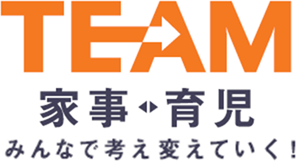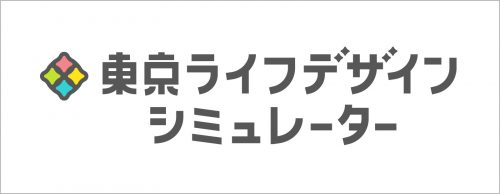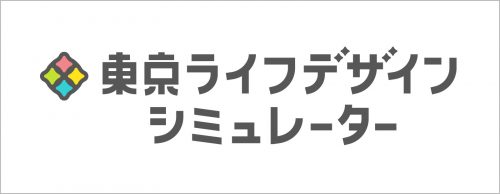Table of Contents
- Parenting Manga: “Even I Can Reform the Way I Work” (Japanese only)
- <Practical tips> Balancing work and family life / Do-it-yourself work style reforms
Parenting Manga: “Even I Can Reform the Way I Work” (Japanese only)




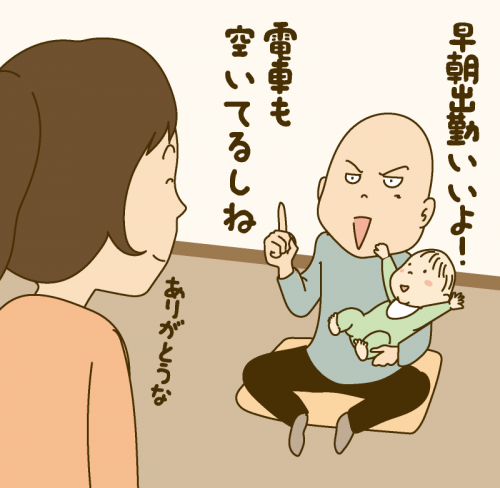

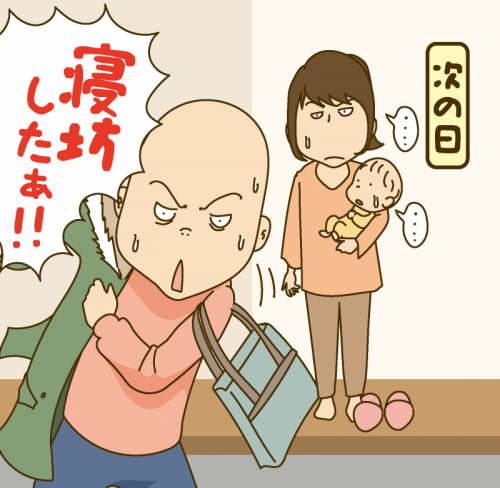


Profile
Eiichi
After working for a design company in Tokyo, he became a freelance illustrator. He is a hard-working father who creates animation, manga, and illustrations, including winning the Yubari International Fantastic Film Festival’s International Short Film Showcase Division Excellence in Animation Award.
<Practical tips> Balancing work and family life / Do-it-yourself work style reforms
Dads hit a bump in the road with housework and childcare.
Overcoming the “Wall”
Many companies have only just begun to reform their work styles, even though they want to leave work early to take care of housework and childcare at home. But you can change the way you work. Let’s have the courage to change our awareness and work style. We interviewed company employee fathers who are implementing “do-it-yourself work style reforms” to find out how they are tackling these issues in their own way.
How do you overcome barriers in the workplace?
Gaining internal understanding through trust-building
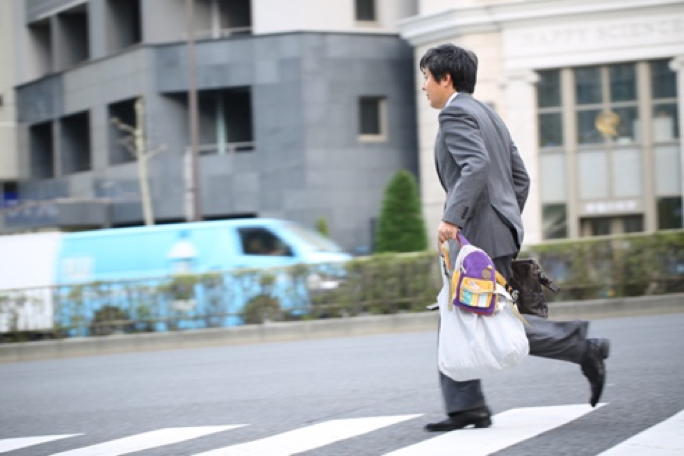 Photo is an image.
Photo is an image.The biggest obstacle in tackling housework and childcare will be the workplace. It is important to gain the understanding of your boss and co-workers. I leave work once a week at 5:30 p.m. to pick up my children from kindergarten. I do not negotiate with my boss about my return time. I announced it out loud every week to those around me to create an image of “ikumen, ” and gradually made it an established fact of my life.
Sometimes, just before I am about to finish work and leave, an urgent job comes in. I feel guilty because I have to leave the work to my supervisor or junior staff members, but I have to let it go. Since there will inevitably be more situations where I will need help from those around me, it is necessary to avoid creating problems that only I can handle and to share information so that my supervisors and junior staff can respond to sudden problems.
The only way to gain understanding within the company is to create a proper relationship of trust within the company on a daily basis. This way, people will naturally imagine that “today is pick-up day,” and in time, they will develop a strong mentality that will not make them feel guilty themselves.
My approach to work has changed since I started raising my children. By necessity, I can see improvements in my work and working style. I tell my bosses that what I have learned through childcare has been useful in my work, and I tell my junior staff that I am setting a precedent for their future (laughs).
To become an “ikumen” who will be supported by others in the company, it is important to build a relationship of trust within the company. It is also necessary to share information so that work can run without you, and to loudly declare to those around you that you are leaving early.
| month | fire | water (esp. cool, fresh water, e.g. drinking water) | tree | money (written before an amount) | ||
|---|---|---|---|---|---|---|
| 7:30 | rising | rising | rising | rising | rising | 7:30 |
| 8:50 | preschool drop-off | preschool drop-off | preschool drop-off | preschool drop-off | preschool drop-off | 8:50 |
| 9:40 | going to work (e.g. in the morning) | going to work (e.g. in the morning) | going to work (e.g. in the morning) | going to work (e.g. in the morning) | going to work (e.g. in the morning) | 9:40 |
| work | work | work | work | work | ||
| 17:30 | leaving office | 17:30 | ||||
| 18:00 | nursery school drop-off and pick-up | 18:00 | ||||
| preparing a meal | ||||||
| 19:00 | meal | 19:00 | ||||
| 21:00 | leaving office | leaving office | Bath with children | leaving office | leaving office | 21:00 |
| 22:00 | returning home | returning home | Reading and bedtime storytelling | returning home | returning home | 22:00 |
| Chatting with children before bedtime | Chatting with children before bedtime | Fall asleep together | Chatting with children before bedtime | Chatting with children before bedtime | ||
| 25:00 | going to bed | going to bed | going to bed | going to bed | 25:00 |
How do you overcome barriers in the workplace?
Increase productivity by stopping doing what you don’t have to do once and for all.
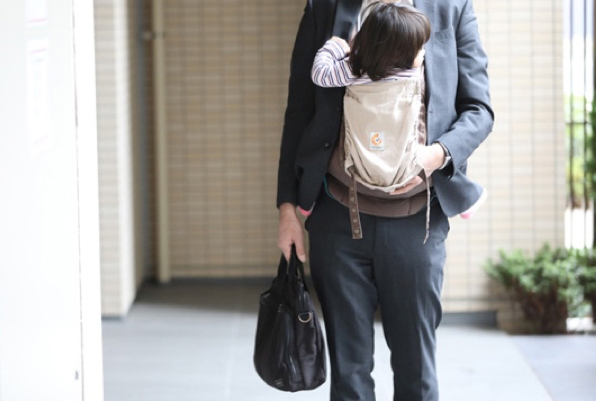 Photo is an image.
Photo is an image.The company’s work schedule is discretionary, so in addition to dropping the children off at daycare each morning, I also pick them up three days a week. On pick-up days, I leave the office at 6:00 pm. Since my marketing job does not reduce my workload, the only way to continue this lifestyle is to increase my productivity. That is why we are working daily with “ECRS” to improve our business operations.
- Eliminate…review the work and eliminate that work
- Combine…Combine operations to reduce time required
- Rearrange…rearrange the order of work to improve efficiency
- Simplify…omit and achieve the same results
The only way to get a limited amount of work done in a limited amount of time is to shorten the process time. The first thing that can be shortened for this purpose is “thinking time. Make decisions as soon as you recognize an issue, or imagine a conditional branch when deciding what to execute next depending on the conditions. Ideas should be written down so that you don’t have to waste time recalling them later. These thoughts take advantage of skimming time during commutes and meals.
Then, we ensure the quality of the work by determining the level of urgency, priority, and whether it should be done by me or by someone else.
Another important thing is to decide what not to do. For example, do not use PowerPoint to create meeting materials, but keep them simple. Our motto is to make a decision at one time, without any kind of rooting around. Without excessive consideration or discovery, we can maintain the results and quality of our work.
In order to meet the requirements of workload and limited time, we should review our work thoroughly once again. The time spent on creating materials and meeting with others should be stopped once and for all, and an attitude of deciding everything at once will lead to better work results. It is also important to identify tasks that do not need to be done.
| month | fire | water (esp. cool, fresh water, e.g. drinking water) | tree | money (written before an amount) | ||
|---|---|---|---|---|---|---|
| 7:00 | Wake up, make breakfast, prepare yourself and children | Wake up, make breakfast, prepare yourself and children | Wake up, make breakfast, prepare yourself and children | Wake up, make breakfast, prepare yourself and children | Wake up, make breakfast, prepare yourself and children | 7:00 |
| 9:00 | preschool drop-off | preschool drop-off | preschool drop-off | preschool drop-off | preschool drop-off | 9:00 |
| 10:00 | going to work (e.g. in the morning) | going to work (e.g. in the morning) | going to work (e.g. in the morning) | going to work (e.g. in the morning) | going to work (e.g. in the morning) | 10:00 |
| work | work | work | work | work | ||
| 18:00 | leaving office | leaving office | leaving office | 18:00 | ||
| 18:30 | shopping | box lunch (containing rice and 10-15 small portions of fish, meat, and vegetables) | 18:30 | |||
| 19:00 | nursery school drop-off and pick-up | nursery school drop-off and pick-up | nursery school drop-off and pick-up | 19:00 | ||
| 19:20 | Return home and make dinner | returning home | eating out | 19:20 | ||
| 19:45 | dinner | dinner | 19:45 | |||
| 20:30 | returning home | 20:30 | ||||
| 20:45 | Bathing with Children | Bathing with Children | Bathing with Children | 20:45 | ||
| 21:45 | lulling a child to sleep | lulling a child to sleep | lulling a child to sleep | 21:45 | ||
| 22:45 | Laundry and preparation for the next day’s daycare | Laundry and preparation for the next day’s daycare | laundry | 22:45 | ||
| 23:00 | leaving office | leaving office | 23:00 | |||
| 23:30 | Dinner (eating out) | one’s own time | one’s own time | Dinner (eating out) | one’s own time | 23:30 |
| 23:45 | going to bed | going to bed | going to bed | 23:45 | ||
| 24:00 | returning home | returning home | 24:00 | |||
| 25:00 | going to bed | going to bed | 25:00 |
How do you overcome barriers in the workplace?
Improve time efficiency with “instantaneous power” to respond as soon as possible
 Photo is an image.
Photo is an image.A senior manager at a general consulting firm who works to solve issues for client companies might traditionally be thought of as a hard worker. However, I actively participate in child-rearing, leaving the office at 6:00 p.m. two or three times a week to pick up my children from daycare. Even on days when I am not in charge of pick-up, I try to get home by 7:00 p.m. and have dinner with my family.
In order to leave the office at 6:00 p.m., we rethink the way we work and focus on getting results in the limited time we have. Work, housework, and childcare are all the same, but time tends to be fragmented and half-hearted, and we tend to get caught up in what we need to do in front of us. To solve this problem, I try to be conscious of my stance on work and how I spend my time in each of the three categories: [individual], [team], and [customer].
Individuals]…Always emphasize “spontaneity. For example, when I receive an e-mail, I make a decision and take action on the spot, and never look at it twice. I reply to each e-mail in 30 seconds, and even if it is short, I am satisfied if it conveys my message. I look at e-mails in the spare time between meetings. I schedule my work as early as possible. Since there is a limit to how fast I can speed up my work, I always work backwards from my goal and reassess my priorities so that I can focus on the most important tasks.
Team] …Even in team management, we ensure that all team members are aware of “results, not the amount of time spent. Our goal is to work together to create an environment in which “if you produce results, you can go home when you want to go home. To this end, we strive to manage in such a way that we can delegate authority appropriately while taking advantage of the strengths of each individual.
We identify the goal image and key points to get there at the earliest possible stage, and work with the client. We are conscious of achieving results efficiently, and we sometimes proactively make proposals to the client by identifying the work that needs to be done and consulting with them on the rearrangement or addition of personnel.
The important thing in time management is to always be aware of the goal (objective). That is the key point in my work, but also in my personal life. The most important thing is communication with my wife. For this reason, we hold an off-site meeting (a camp for family meetings) once every three or six months, where we share our reflections and what we would like to do in the future by writing them down on sticky notes.
In terms of increasing time efficiency in your personal life, I recommend that you and your wife do the housework and childcare together. For example, I can wash the dishes while my wife and daughter take a bath. Also, if we work together, even if we have occasional quarrels or problems while doing housework and childcare, we can laugh together and turn them into enjoyment. If you take some offline time at home without looking at your cell phone, you will be able to focus on your housework and childcare and feel refreshed.
As a father, try to “make it about you” by doing everything except breastfeeding. I believe that doing so will change you from feeling that “housework/childcare is taking up your time” to being able to enjoy housework/childcare on your own initiative.
By always being aware of how to use limited time to maximize work results, time management will naturally change. Sending and receiving e-mail, which tends to take up a lot of time, can be made more time efficient by simply adopting the technique of making decisions immediately without showing it twice.
| month | fire | water (esp. cool, fresh water, e.g. drinking water) | tree | money (written before an amount) | ||
|---|---|---|---|---|---|---|
| 7:00 | rising | rising | 7:00 | |||
| 8:00 | rising | Take out trash, do laundry, clean up after meals, come to work | rising | Take out trash, clean up after meals, come to work | rising | 8:00 |
| 9:00 | Taking out the trash and dropping off children at daycare | work | preschool drop-off | work | preschool drop-off | 9:00 |
| 10:00 | going to work (e.g. in the morning) | going to work (e.g. in the morning) | going to work (e.g. in the morning) | 10:00 | ||
| work | work | work | ||||
| 18:00 | leaving office | leaving office | 18:00 | |||
| 18:25 | leaving office | leaving office | leaving office | 18:25 | ||
| 18:30 | nursery school drop-off and pick-up | nursery school drop-off and pick-up | 18:30 | |||
| 19:00 | returning home | returning home | returning home | returning home | returning home | 19:00 |
| Meals and gatherings | Meals and gatherings | Meals and gatherings | Meals and gatherings | Meals and gatherings | ||
| Bedtime, cleaning up after meals, washing baths | Laundry, meal cleanup, bath washing | Bedtime, cleaning up after meals, washing baths | Laundry, meal cleanup, bath washing | Bedtime, laundry, meal cleanup, bath washing | ||
| 21:00 | Telecommuting, time with wife, time for myself | Tucking yourself in while going to bed | Telecommuting, time with wife, time for myself | Tucking yourself in while going to bed | Telecommuting, time with wife, time for myself | 21:00 |
| 24:00 | going to bed | going to bed | going to bed | 24:00 |
Let me say
“do-it-yourself work reform”
We also spoke with Toshiyuki Tanaka, associate professor at Taisho University and supervisor of Papa’s Style, and Manabu Tsukagoshi, senior senior consultant at Toray Management Research Institute!
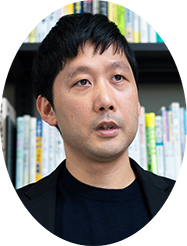
If you value child care.
Work will not continue as before.
I am very encouraged by the various efforts everyone is making to spend time with their families out of a sense of being a parent, and I can say that society is changing dramatically, considering that until about 10 years ago it was rare for a father to even drop off his children at daycare. Even weekend parks are now full of fathers and their children. Of course, it is not necessary to implement all of the examples presented here. You can choose what you think you can do and incorporate it into your daily life. That said, some dads may be intimidated when they hear stories of how they have increased their productivity by streamlining their work. As a regular guy, my work performance is also proportional to the time I put in. So I try to think simply that if I want to focus on child-rearing, I cannot work as much as I have in the past, and if I want to work as much as I have in the past, I cannot focus on child-rearing. I am home by 6:30 p.m. every day, and on Mondays I have home childcare, so naturally my work performance has declined. But I’m okay with that. What an ordinary man, a futsumen so to speak, can do is to have a firm sense of his own values, regardless of whether he focuses on child rearing or work,” says Toshiyuki Tanaka.
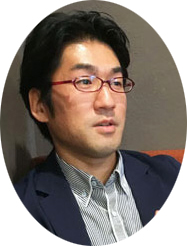
Work with an end time in mind
I didn’t take it for granted.
The common denominator among the ingenious people is that they work with an eye toward the end of the day. In other words, they decide on the time ahead of time and proceed with their work within that time frame. This may seem obvious, but this has not been the case in the Japanese workplace to date. Unlike in European countries, where the upper limit of working hours is set by law and regulations, and results are demanded within a limited time frame, in Japan, the workload is determined in advance and the working hours end when the work is completed, which has been the case for 70 years in effect. People tend to work more when they have more time. In Japan, where there was practically no upper limit to working hours, it is only natural that a mixture of important and less important work would increase, leading to a workplace with long working hours. However, from April 2019 onward, Japan will approach European-style with tighter limits on working hours, thanks to the first legal revision in 70 years. These work style innovations by fathers raising children will be required of all of us in the workplace. Those of you who are ahead of the curve will have an advantage, so let’s continue with confidence to set an example in the workplace,” says Manabu Tsukagoshi.
First, there is the happiness of workers and
The company is there to keep it going. <Part 1
I was a workaholic who wanted to work whenever I had free time, otherwise I would feel anxious. When my first child was born in 2010, I took childcare leave and was surprised at how hard it was to raise a child. At first I was a little reluctant to run away, but then my second child was born, and then my third, and gradually I couldn’t run away anymore (laughs).
You will also get better ideas if you do housework and childcare. Being in the office for long hours means less input. Since I started housekeeping, I can talk about the issue of children waiting for daycare, and I am more familiar with local government, schools, and hospitals. I also go to the supermarket, so I understand the retail business now. This raises the level of various decisions and helps me understand where the needs of society are.
In the future society, people will be working with such people while raising children or taking care of family members, and groupware (*) will have to be like this. Second jobs will be commonplace, people will work from home, work from their smartphones, and how to work efficiently in a short time will become important.
Cybozu boasts a large share of the market for groupware that utilizes computer networks to share information within organizations.
But at first I was conflicted, wondering why I was doing this. However, there is a learning curve to everything. Hanging the laundry out to dry is tedious, but while hanging it out to dry, I can observe the weather and what’s going on outside, or I can just sit in peace and think about things. I had never had that kind of time before. It is a casual time to spend with my children. I am beginning to realize that this is what happiness is all about.
My happiness is that I gobbled up my goals and moved forward today more than yesterday and tomorrow more than today. I thought this was happiness. Now I have a family and they are happy and laughing. I think this is great, this is happiness. I honestly didn’t understand that until recently. How workaholic I was.
Humans want to be happy. We want money because we feel happy when we have lots of money. The reason people created companies was to create a system that would make people happier. However, company profits take precedence over human happiness. That is not right. First, there must be the happiness of the people who work for the company, and then the company must be structured to sustain that happiness. Somewhere the ends and means have been switched. (*Continued in Part 6 )
Yoshihisa Aono
In 1997, he founded Cybozu with his boss, Mr. Noboru Takasuga, and his college senior, Mr. Shinya Hata. He has promoted work style reform within the company, reducing the turnover rate to one-sixth, and has taken childcare leave three times as a father of three children. In 2011, he began shifting the company’s business to cloud computing, which has grown to account for more than half of the company’s sales. He is an external advisor to the Ministry of Internal Affairs and Communications, the Ministry of Health, Labor and Welfare, the Ministry of Economy, Trade and Industry, the Cabinet Office, and the Cabinet Secretariat’s Working Style Reform Project, as well as vice chairman of CSAJ (Computer Software Association of Japan). He is also the vice president of the Computer Software Association of Japan (CSAJ). (PHP Research Institute).

